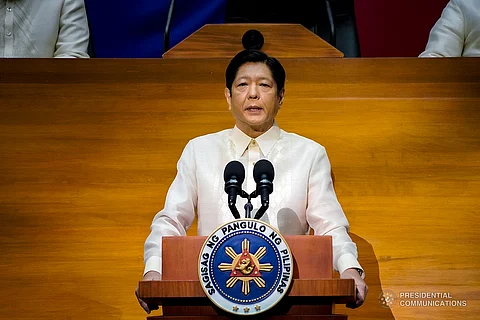
- NEWS
- the EDIT
- COMMENTARY
- BUSINESS
- LIFE
- SHOW
- ACTION
- GLOBAL GOALS
- SNAPS
- DYARYO TIRADA
- MORE

In his fourth State of the Nation Address (SoNA) on Monday, President Ferdinand Marcos Jr. reaffirmed his administration’s commitment to strengthening the peace and national security as the cornerstone of the “Bagong Pilipinas” (New Philippines) vision.
Marcos highlighted the significant strides made in modernization, reintegration, and law enforcement.
Speaking in Filipino, he emphasized that peace is an essential foundation for progress.
“Peace is a vital foundation of the New Philippines, which is why we are strengthening it alongside our progress,” he said.
The President cited ongoing efforts to modernize the Philippine National Police (PNP) and the Armed Forces of the Philippines (AFP).
He noted that new arms, combat vehicles, and equipment continue to be acquired to ensure a stronger, more responsive defense across the country.
“We continue to strengthen our police and armed forces,” he said.
Marcos also underscored the significant strides made in the initiatives to reintegrate former rebels into mainstream society, helping them to rebuild their lives and contribute to lasting peace.
“We support the thousands who once took up arms against the government but have chosen to return to the fold and rebuild their lives, along with their families,” he said.
With support from the private sector, he said the government is developing infrastructure — roads, irrigation systems, and livelihood programs — in communities previously affected by conflict.
Beyond economic assistance, Marcos said the administration has built health centers, classrooms, water systems, and streetlights, directly benefiting over 13 million Filipinos in formerly conflict-ridden areas.
No more rebels
Significantly, the President declared that there are no more active guerrilla groups in the country.
“The government will ensure that no new insurgent groups will ever form again,” he said.
Meanwhile, the President praised the unity among the AFP, PNP, and former rebels in maintaining peace and order, especially in the Bangsamoro Autonomous Region in Muslim Mindanao (BARMM).
“The AFP, PNP, and former rebels are now united in maintaining order and peace in the BARMM. That’s why our society today is more peaceful, more protective of human rights, regardless of age, gender, condition, or group,” he said.
On the other hand, Marcos recognized existing concerns about criminality, despite the reported decline in the crime rate.
He underscored the PNP’s commitment to rapid response, promising that officers would respond to emergencies within five minutes.
He also addressed the issue of the disappearances tied to illegal online gambling and cockfighting.
“The entire government is working together to resolve the cases of those who went missing due to the ruthless actions of the syndicates behind the dark world of illegal cockfighting,” he said.
The President warned his administration would go after those behind these crimes.
“We will go after and hold accountable the masterminds and all those involved, whether civilians or officials. No matter how powerful, influential, or wealthy they are, they will not be above the law,” he said.
“Above all, we will make the perpetrators feel the full weight of the punishment for these heinous crimes.”
Anti-drug campaign
President Ferdinand Marcos Jr. highlighted his administration’s recalibrated war on drugs, which targets both large-scale shipments and street-level transactions.
In his fourth State of the Nation Address, Marcos said recent operations have intercepted P8 billion worth of illegal drugs from various parts of the country — including Zambales, Pangasinan, Cagayan, Tondo, Muntinlupa, Ilocos Sur, Ilocos Norte, Cebu, Batangas, Rizal and Cavite.
Last month, he led the destruction of seized narcotics, including the so-called “floating shabu” recovered in Capas, Tarlac. The process took over 24 hours to complete.
Authorities have arrested 153,000 individuals linked to the drug trade over the past three years — including 677 government personnel, more than 100 elected officials, and nearly 50 police officers.
“In just three years, the total arrests have almost matched the previous administration’s. Yet pushers seem to be returning,” Marcos said.
“That’s why our operations — whether against big-time or small-time dealers — continue,” he added, asserting that the government’s new approach is both effective and sustainable.
